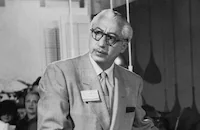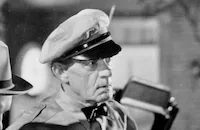Sunny
Cast & Crew
Herbert Wilcox
Anna Neagle
Ray Bolger
John Carroll
Edward Everett Horton
The Hartmans:
Film Details
Technical Specs

Synopsis
In the crush of the Mardi Gras festivities, Larry Warren, the scion of a wealthy New Orleans family, is thrown together with Sunny O'Sullivan, a bareback rider in the circus. Commanded to kiss by the Queen of Hearts and her court, the two embrace, after which Sunny disappears into the night. Enchanted by his brief encounter with Sunny, Larry goes to the circus, where he joins his sister Elizabeth, family attorney Henry Bates and debutante Juliet Runnymeade. To his delight, Larry sees Sunny dancing onstage and rushes out to send her a bouquet of flowers. Larry tries to make a date to meet Sunny after the show, but when a misunderstanding results in Sunny thinking that she has been stood up, she joins her friend, Bunny Billings, instead. When Sunny and Larry accidentally meet again at a restaurant, Larry pulls Sunny away from her friends and leads her on a tour of the city. By night's end, the two have fallen in love and Larry proposes. After bidding her circus friends farewell, Sunny goes to Waverly Hall, the Warrens' ancestral home, to meet Larry's crusty aunt Barbara and the rest of the family. At a formal reception that night, Elizabeth snubs Sunny, and Aunt Barbara instructs Henry to "buy off" Sunny. Henry's business proposal sends Sunny to bed sobbing until Aunt Barbara, who was testing the girl, welcomes her into the family. On the day of the wedding, most of the social register is at the Waverly house when Bunny and the circus troupe arrive to surprise Sunny. Snatching a last minute opportunity to humiliate Sunny, Elizabeth suggests that the group perform before the ceremony. Encouraged by the dancing antics of Juliet and her partner Egghead, the troupe begins to show off. Sunny is stunned when Larry orders her friends out of his house, and leaves with the troupe and returns to the circus. On opening night, the show is sold out, but when Sunny goes onstage, she discovers that Larry has bought all the tickets. Furious, Sunny storms off the stage and locks herself in her trailer. Larry then hitches the trailer to his car and tows it to a waiting riverboat. Aboard the boat, Sunny runs out on deck, and when Larry fears that she has fallen overboard, he jumps in the river to save her. Larry's brush with death forces Sunny to realize that she still loves him and the two reconcile.

Director

Herbert Wilcox
Cast

Anna Neagle

Ray Bolger

John Carroll

Edward Everett Horton
The Hartmans:
Grace Hartman
Paul Hartman

Frieda Inescort

Helen Westley

Benny Rubin
Muggins Davies

Richard Lane
Martha Tilton
Fred Santley
Granville Owen
Torben Meyer

Halliwell Hobbes
John Ward
Earl Clyde
Edgar Clyde
Harold De Garro
Armand Wright
Willa Pearl Curtis
Peggy Remington
Ed Mortimer
Jean Fowler
Bert Moorhouse
James Carlisle

Bess Flowers
Larry Steers
Florence Wix
Ernestine Clark
Gene Clark
Bruce Cameron
Buddy Henry
Edna Holland
Don Kerr
Sherrill Luke
Kay Sutton

Lew Kelly
Diane Marshall

James Flavin
Crew
Aida Broadbent
Ernestine Clarke
Anthony Collins
Anthony Collins
Oscar Hammerstein Ii
Otto Harbach
Sig Herzig
Kenneth Holmes
J. Roy Hunt
Jerome Kern
Leon Leonidoff
Russell Metty
Marco Montedoro
Gene Rose
Darrell Silvera
Edward Stevenson
Helen Thurston
Marcus Turk
Richard Van Hessen
Vernon L. Walker
Merrill G. White
Herbert Wilcox
Herbert Wilcox
Elmo Williams
L. P. Williams

Film Details
Technical Specs

Award Nominations
Best Score
Quotes
Trivia
Notes
The film opens with the following prologue: "New Orleans-Crescent City of the Old South-where Rex, the King of Mischief, Reigns Over the Mardi Gras For One Mad Week." According to news items in Hollywood Reporter, producer Herbert Wilcox bought the rights to the play from Warner Bros. as a vehicle for Anna Neagle. This was the third musical comedy collaboration between RKO, Neagle and Wilcox. In 1940, Wilcox and Neagle adapted the musical comedies Irene and No, No Nanette to the screen (see AFI Catalog of Feature Films, 1931-40; F3.2156 & F3.3161). According to another news item in Hollywood Reporter, Ken Englund was hired to write the screenplay, but his contribution to the final film has not been confirmed.
Other news items in Hollywood Reporter yield the following information: May Robson was prevented from playing the role of "Aunt Barbara" because of a prior commitment. J. Roy Hunt shot the Mardi Gras backgrounds in New Orleans. Vaudeville performer Muggins Davies ended fifteen years of retirement to play "Muggins" in this film. John Carroll was loaned from M-G-M to appear as "Larry Warren." A news item in New York Times adds that Ernestine Clark, who doubled for Anna Neagle in the film, was a famed equestrienne and aerialist for the Ringling Bros. circus. This picture was nominated for an Academy Award for Best Score. A previous adaptation of the Otto Harbach, Oscar Hammerstein II and Jerome Kern play was filmed by Warner Bros. in 1930, directed by William Seiter and starring Marilyn Miller, who played the role on Broadway (see AFI Catalog of Feature Films, 1921-30; F2.5465). According to news item in Los Angeles Times, in 1952 Warner Bros. was planning to film an updated version of the play starring Doris Day, but that film was never made.












